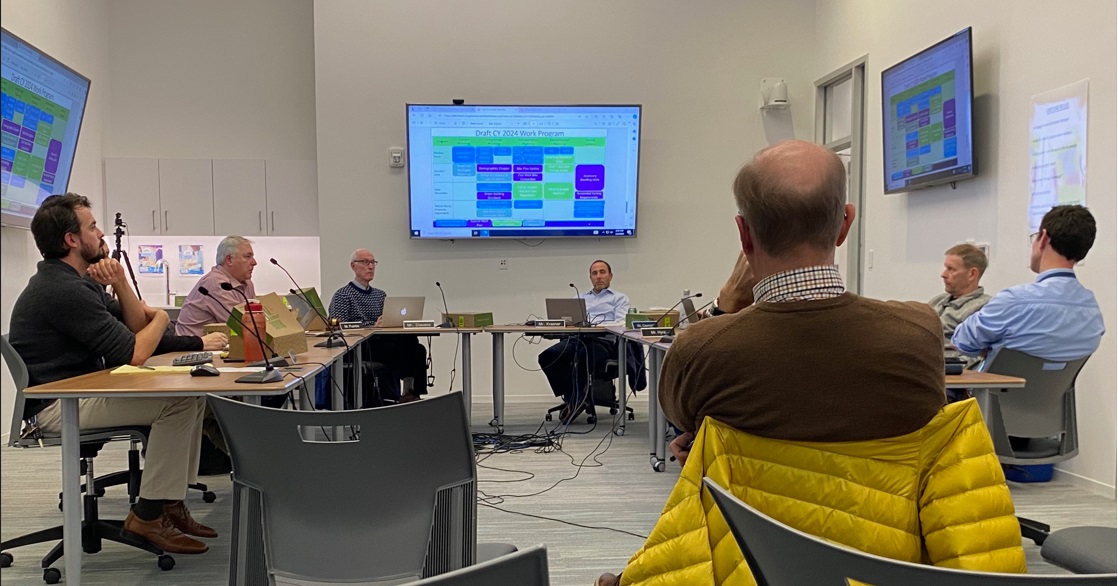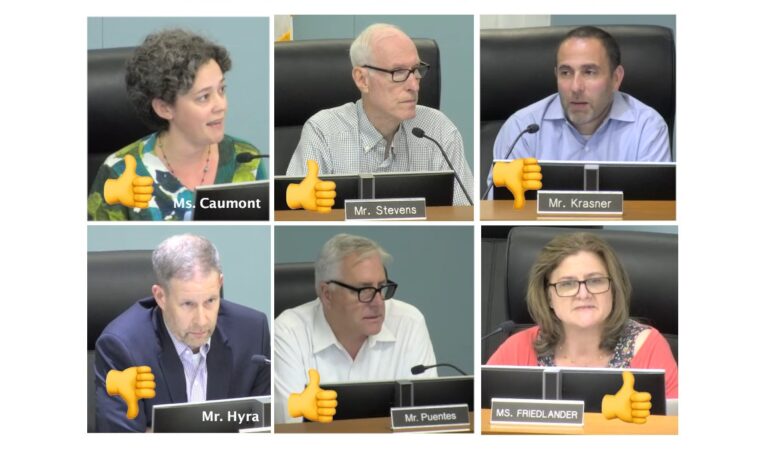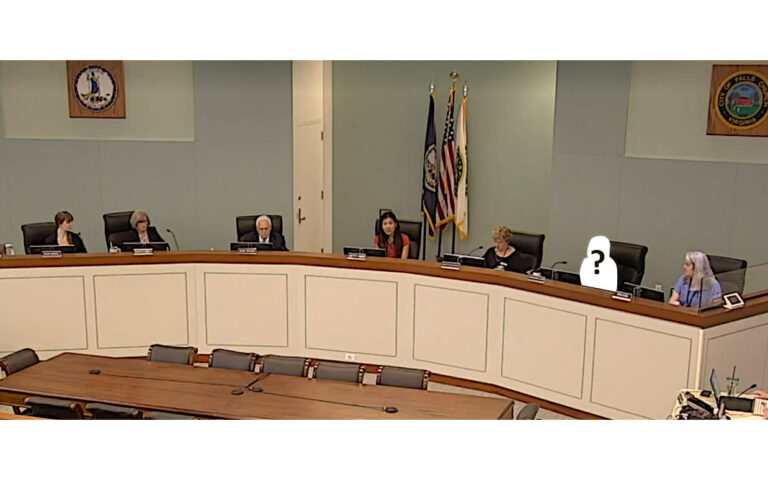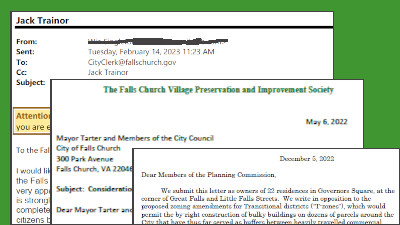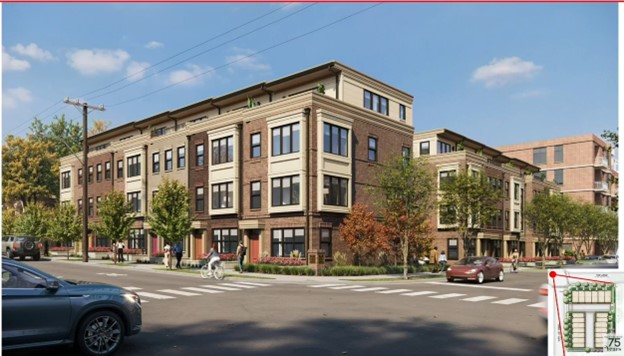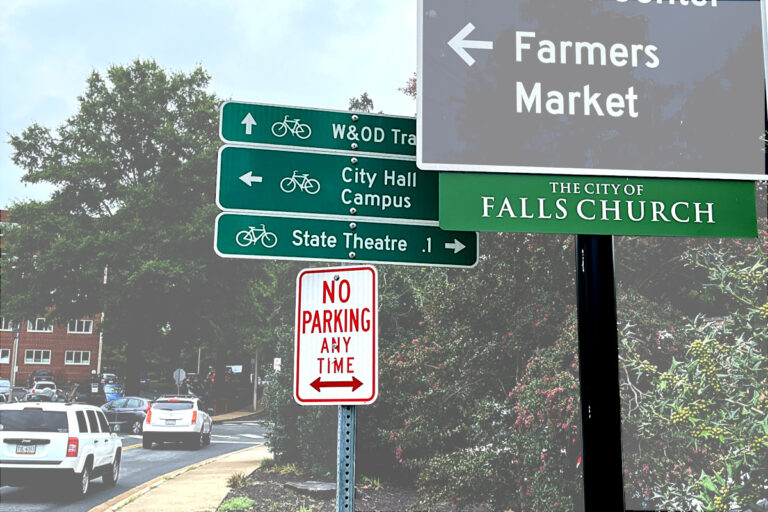Planning Commission Discusses 2024 Planning Agenda and Public Engagement
At its organizational meeting and work session on January 3, 2024, the Planning Commission elected a new chair and vice chair, discussed proposals regarding public engagement, and reviewed and commented on a draft 2024 planning agenda proposed by City staff.
Neither streamed nor recorded
However, despite the Commission’s stated commitment to public engagement, the meeting was not streamed or recorded. When staff were asked about these omissions, Deputy City Clerk Veronica K. Price responded that “The Planning Director has indicated the Planning Commission prefers not to record their annual retreat, so that is why the meeting was not streamed and will not have a video available.”
This decision, which appears to have been made minutes before the meeting began, contrasts with similar Planning Commission organizational meetings for several years prior to 2023 that were both streamed and recorded. Further, the January 3 meeting was advertised to the public not as a “retreat” but rather as a “Meeting and Public Hearing of the City of Falls Church Planning Commission.” In fact, the meeting was held in City Hall, and members of the public were able to attend in person.
Engaging the public
Following the election of Robert Puentes as chair of the Planning Commission and Andrea Caumont as vice chair for 2024, the meeting dealt briefly with procedures, including public engagement for major planning efforts, and then focused on the 2024 planning agenda proposed for discussion by City Planning Director Paul Stoddard.
Addressing public involvement in planning, Mr. Stoddard referenced the annual service survey of Planning Commissioners as well as an October 23, 2023, staff memo to the Government Operations Committee titled “T-Zones Takeaways: Considerations for Improving Public Engagement.”
Two of the six current Commissioners responded to the survey. One Commissioner recommended additional emphasis by staff in two areas:
“First is the need to improve public outreach on key items, especially zoning changes. The Transition Zone Amendment process involved many complex changes that were not readily apparent to some sectors of the public. While there were several excellent public forums and a walking tour, these events occurred late in the process after many had reached conclusions. Holding public information and Q and A sessions early in the code changing process is desirable (indeed, these types of events might best occur prior to issuance of draft code change language). This will require that you have on your staff someone who specializes on public outreach.”
“Second, I continue to think that finding a way to simplify the language in our motions would help the public better understand Planning Commission actions and would make life a little easier for Planning Commissioners who are making a Motion. We often seem to be reading out very long and challenging language in our Motions. City Council has found a way for their Motion language to be simpler, and it should be similar for the Planning Commission.”
Proposed improvements
In response, Mr. Stoddard said the staff recommended the following procedural improvements:
- For Site Plan applications, post yard signs in advance of the first Planning Commission work session. Mr. Stoddard noted that this is similar to the procedures for Subdivision applications, which were adjusted a few years ago.
- For Zoning Amendments, increase awareness of changes being considered and include earlier opportunities for interaction with the general public. This could include more use of yard signs and increased web presence. It could also include town halls and pop-up meetings at the Farmers’ Market. Note that many of these tools are regularly used for other long-range planning activities, such as Comprehensive Plan updates and Small Area Planning. See the attached “T-Zones Takeaways Considerations for Improving Public Engagement” for additional ideas. [These ideas include clarifying the public purpose of zoning changes, adequately staffing rezoning efforts, creating a public engagement plan at the beginning of each project, developing an outreach toolkit with such items as a community Frequently Asked Questions document and information videos, and ensuring that staff reports are clear and complete.]
- As part of the City’s upcoming website redesign, explore opportunities to enable tracking of / notifications for specific projects, in addition to how the work of boards and commissions can be followed.
Commissioner Brent Krasner recommended the use in staff reports of more graphics and an executive summary that highlights remaining issues. Depending on the project, Vice Chair Caumont urged the staff to think of more places to engage the public than the Farmers’ Market held on Saturdays in the City Hall parking lot. Commissioner Tim Stevens said he found the pop-up events hosted at the Eden Center during last year’s discussion of the East End Small Area Plan to be “very effective.”
A need to rebuild trust
Commissioners failed to discuss a detailed December 29, 2023, memo submitted by citizen W. Frederick Thompson to the Planning Commission with recommendations on how to improve public engagement. Mr. Thompson was singled out by name during the Government Operations, Administration, and Evaluations Committee meeting last October where the “T-Zones Takeaways” memo was first discussed by members of the City Council and City staff as someone who “radicalized” citizens regarding the rezoning of Falls Church’s transition zones.
In his memo to the Commission, Mr. Thompson asserts that much more needs to be done to increase public involvement than has been proposed thus far. In particular, he recommends inclusive public conversations that invite two-way dialogue between citizens and their elected and appointed representatives. He further urges performing and providing relevant studies before initiating legislation, thoroughly investigating concerns about conflicts of interest, and ensuring that the City’s zoning code is both accurate and up to date.
Mr. Thompson concludes:
“The T-Zone approval process has left a significant number of Falls Church citizens feeling that our government has not been transparent or responsive and did not work with us in a collegial and cooperative way. Instead, real estate developers played a disproportionate role in developing, modifying and enacting the proposals. That trust can be rebuilt if the [City] Council and the Planning Commission address future change proposals in a more structured, open and transparent way.”
2024 Planning agenda
Mr. Stoddard presented a draft of the Planning Division’s agenda for the year ahead and invited Commissioners’ comments. Divided into the first and second halves of 2024, the proposed plan includes a new demographics chapter for the City’s Comprehensive Plan, zoning updates for accessory dwelling units (sometimes called “granny flats”), and residential parking requirements as well as bike plan updates and connections across the City, rezoning of the Tinner Hill/Southgate area of Falls Church, and commissioning of an East End cultural landscape study.
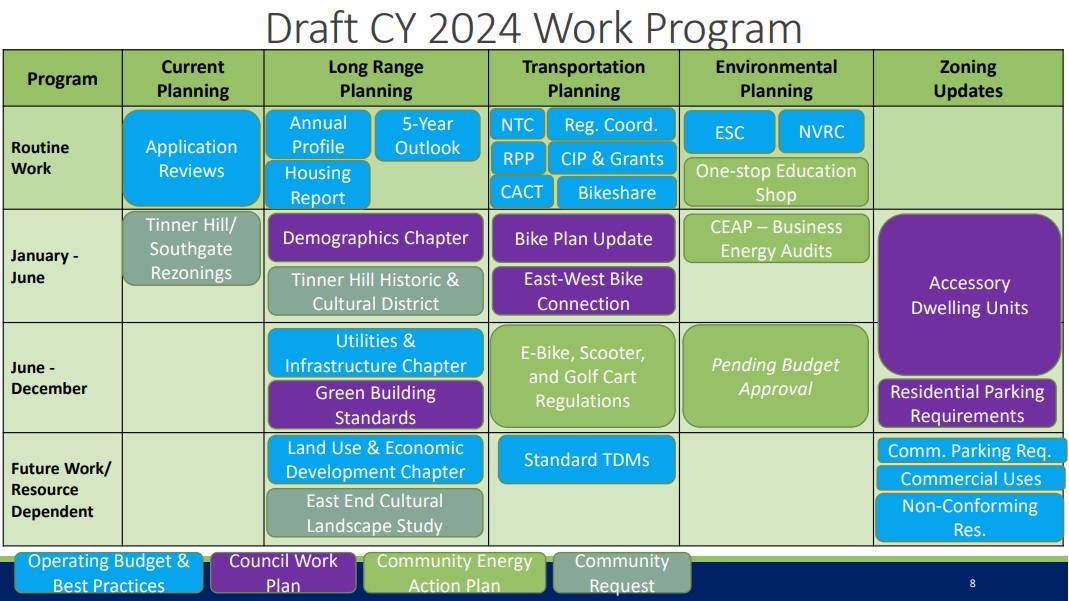
Hot-button issue
Following Mr. Stoddard’s presentation, Commissioner Krasner asked, “Are we really tackling accessory dwelling units this year?” and suggested that doing so would be opening “Pandora’s Box.” Having addressed accessory dwellings as part of the planning staff in Fairfax County, Mr. Krasner said he “knows this is a hot-button issue that will take a lot of staff and Planning Commission time” that could be spent on other issues.
When Mr. Stoddard responded that City Council members who are part of the Government Operations Committee (in 2023, Phil Duncan, Letty Hardi, and Debbie Schantz-Hiscott) expect updated zoning of accessory dwellings to be accomplished this year, Mr. Krasner said, “If you think T-Zones got people excited,” accessory dwellings will be even more controversial because they will affect citizens throughout the City. “We should buckle up and be prepared.” His fellow Commissioners agreed, rating this element of the 2024 planning agenda the one that would require the most public engagement, followed by the bike plan update.
Mr. Stoddard said the staff plans to conduct a public survey early on in the accessory dwelling zoning update to surface issues of concern to the public, such as the potential loss of trees and privacy from building these detached units, their allowable size and height, and their possible rental to a more transient population. He promised more analysis early on and a term sheet before any code is written. Commissioners Stevens and Caumont suggested that the Planning Commission invite speakers from Arlington and Fairfax Counties to share their experiences with zoning for accessory dwellings.
Potential additions to the 2024 planning agenda
Mr. Stoddard also asked Commissioners to indicate what they see missing from the planning agenda and recommended that they lobby the City Council to include those items that matter most to them. Commissioners suggested the following additional items:
- Create a Land Bank and a Land Bank Authority that can be leveraged to provide resources to build more affordable housing (Derek Hyra with support from Mr. Puentes, Ms. Caumont, and Mr. Stevens)
- Further enhance programs that support small businesses in the City – a Main Street/Small Business Support initiative (Ms. Caumont)
- Address missing sidewalk links and above-ground utility infrastructure that impedes pedestrian access on sidewalks (Mr. Krasner)
- Explore a power purchase agreement (e.g., for a shared solar panel farm) with neighboring jurisdictions (Mr. Stevens)
- Extend the anti-displacement policy and toolkit initially included in the East End Small Area Plan to apply citywide (Mr. Puentes)
- Develop a strategic affordable housing master plan that lays out what the City wants to see in 10 years using outside expert resources (Mr. Hyra, Mr. Puentes)
- Adopt Vision Zero and Complete Streets policies to ensure that City streets are engineered to maximize safety for all users (Ms. Caumont)
- Continue zoning modernization efforts and updates (Mr. Krasner)
- Address consequences of major construction across the City by managing such issues as synchronizing traffic lights; refrain from adding much more building “until we calm down everyday life in the City” (Mr. Stevens)
References
- “T-Zones Takeaways Considerations for Improving Public Engagement”, October 23, 2023, Staff memo to Government Operations Committee.
- “2023 Service Survey, results”, Planning Commission meeting of January 3, 2024.
- “Planning in the City of Falls Church: Planning Commission Advance”, January 2024, Paul Stoddard’s presentation at the Planning Commission meeting of January 3, 2024.
- “Improving Public Engagement: T-Zone Takeaways”, December 29, 2023, Letter from W. Frederick Thompson to the Planning Commission.

